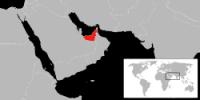|
|
|
The state is a federation of seven emirates (equivalent to principalities), each governed by a hereditary emir, with a single national president. The constituent emirates are Abu Dhabi, Ajman, Dubai, Fujairah, Ras al-Khaimah, Sharjah, and Umm al-Quwain. The capital is Abu Dhabi, which is also the state's center of political, industrial, and cultural activities. Prior to independence in 1971, the UAE was known as the Trucial States or Trucial Oman, in reference to a 19th-century truce between the local sheikhs, hereditary rulers of the territories, and the United Kingdom. The term Pirate Coast was also used by some to refer to the emirates from the 18th to the early 20th century, owing to the preponderance of pirates operating from emirati ports. The UAE's political system, based on its 1971 Constitution, is composed of several intricately connected governing bodies. As a federation of seven monarchies, whose rulers retain absolute power within their emirates, but with a UAE president, it is neither a constitutional monarchy nor a republic. The emirs chose one of their number to be the president of the federation, but this does not alter the monarchical character of the government of the individual emirates. The constitution is concerned solely with the relations between the emirates as members of the federation, and does not prescribe a constitutional system of government. Islam is the official religion of the state, and Arabic is the official language. Its oil reserves are ranked as the world's sixth-largest and the UAE possesses one of the most-developed economies in West Asia. It is the thirty-fifth-largest economy at market exchange rates, and has a high per capita gross domestic product (GDP), with a nominal per capita GDP of US$47,407 as per the International Monetary Fund (IMF). It is 15th in purchasing power per capita and has a relatively high Human Development Index for the Asian continent, ranking thirty-second globally. The UAE is classified as a high-income developing economy by the IMF. |




 RSS
RSS